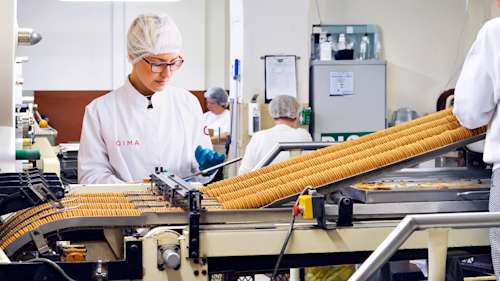HACCP, or Hazard Analysis and Critical Control Point, is a proven management system in which food safety is addressed through the analysis and control of biological, chemical, and physical hazards in raw material production, procurement, handling, manufacturing, distribution, preparation and consumption of food products. By applying HACCP methods, you can ensure farm-to-fork food safety effectively and efficiently.
HACCP requirements are included in food safety regulations in the United States, Canada, Mexico, the United Kingdom, and the European Union. Organizations outside these areas may also need HACCP certification to access these markets.
Regardless of location, the principles of HACCP are the same. Wherever you are located, QIMA can help you evaluate your food production processes, address any identified inconsistencies, and become HACCP certified.
HACCP Certification Value
Since it requires a strong food safety management program, HACCP certification prepares you for food safety inspections and audits. HACCP also requires effective data collection and reporting processes, which can serve your legal defense if needed and can provide information to improve your supply chain management, inventory accuracy, and cost control.
Where required by law, HACCP certification gives you access to the market. Whether required or not, HACCP certification establishes you as a reputable brand. HACCP helps you safeguard and prove the reliable safety of your products, greatly reducing the risks of negative press due to safety failures and increasing consumer confidence. HACCP certification not only assures the authorities that you meet food safety requirements, but also your customers.
Principles of HACCP
Whether you are in the business of farming, food production/manufacturing, packaging, distribution, retail sales, or food service, the same seven HACCP principles apply:
Conduct a Hazard Analysis – Know the biological, chemical or physical risks likely to occur in your processes which will cause illness or injury if not controlled.
Determine the Critical Control Points (CCP) – Identify the point/step/procedure at where a control can prevent, eliminate, or reduce to acceptable levels a food safety hazard.
Establish Critical Limits – Define the maximum or minimum value to which a parameter (e.g., temperature, time, physical dimensions, presence of pathogens) must be controlled to prevent, eliminate, or reduce the food safety hazard.
Establish Monitoring Procedures – Establish planned observations or measurements to determine and record whether a hazard is under control at a CCP.
Establish Corrective Actions – For each CCP where a CL is not met, identify the actions to be taken (eliminating the cause, ensuring future control, disposing of the product).
Establish Record Keeping Procedures – Ensure that all measurements taken at a CCP and any corrective actions are documented and records are retained for verification.
Establish Verification Procedures – Validate that controls are sufficient to manage likely hazards, ensure that the HACCP system is working, and reassess the plan periodically.
By applying these principles and putting a food safety management system in place that follows the strict requirements of HACCP auditing and assurance, you can prove your organization’s commitment to food safety and earn HACCP certification from QIMA.
What are QIMA's HACCP Certification codes?
There are two levels of certification to suit your size, maturity, and needs: HACCP Codex and HACCP Plus.
HACCP Codex
This certification, based on Codex Alimentarius 2020, supports food manufacturers in achieving compliance, requiring essential practices such as HACCP or risk management, a safe processing environment, traceability, trained personnel, a risk assessment program, and proper handling of nonconformities.
HACCP Plus
Based on Codex Alimentarius 2020 and GFSI 2020, it brings together essential food safety requirements such as food defense, plant security, and complaint management. QIMA HACCP Mark available.
Need more information?
By contacting QIMA you agree to our privacy policy and terms and conditions.
Why Do You Need HACCP Certification?
Add value to your products, access new markets, and increase business opportunities by complying with globally recognized food safety standards.
Reduce your exposure to risks impacting brand reputation associated with food safety failures leading to illness or injury.
Improve food safety reliability by correcting identified non-conformities.
Continuously improve the efficiency of your production processes and management systems while ensuring food safety.
HACCP Certification complements GFSI-benchmarked Standards, affirming the safety and quality of your products.
Why Choose QIMA for HACCP Certification?
Protect your certifications and market access with one partner across food safety, organic, and sustainability
Responsive, expert support throughout your certification journey, trusted by clients with a 72 NPS
Reduce audit fatigue with combined audits that save time and cost
Pay faster with QIMA Click & Pay, using instant quotes and secure online payments to keep audits and certification timelines on track




